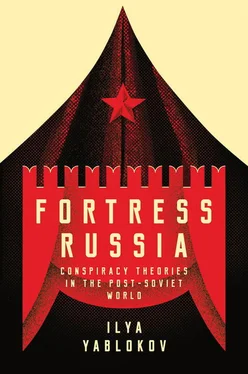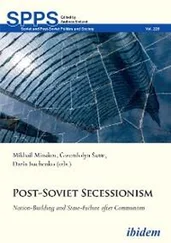These accusations coincided with intensified US activity in post-Soviet countries. President Bush actively supported the political changes in the CIS countries, stating that we live ‘in historic times when freedom is advancing, from the Black Sea to the Caspian, and to the Persian Gulf and beyond’ (BBC, 2005). References to US involvement in the politics of the post-Soviet space, to the detriment of Russia’s interests, as well as a massive propaganda campaign promoting the notion of ‘sovereign democracy’, contributed to the image of Russia as a ‘besieged fortress’. In this context, the regime did not expect the absence of international observers to have an impact on the public perception of the elections’ legitimacy. At the same time, claims made by alternative international observers from Serbia and CIS states that the elections were carried out in accordance with democratic standards, were widely reported in the pro-Kremlin media (Izvestiia, 2007).
In this context, anti-Western conspiracy theories worked as a tool to delegitimize foreign observers. The possibility of challenging the validity of the elections in December 2007 was pre-empted by anti-Western conspiracy theories which were disseminated on the eve of elections. Claims that the OSCE observers were biased provided an argument as to why the Russian public should ignore external criticism of the election results. At the same time, any criticism of the Kremlin’s policies in the 2000s was counterbalanced by references to the chaos of the 1990s, and the possibility of a revival of those terrible times if United Russia were to lose the elections. This prospect, framed by conspiracy narratives, was at the heart of Putin’s speeches on the eve of the elections.
The Leader Defines the Enemy
A mass rally of Putin’s supporters was held at the Luzhniki stadium on 21 November 2007; this was a key feature of the campaign to establish Putin as the irreplaceable Russian leader and strengthen the position of United Russia . Putin’s active engagement in the campaign during its final stage was of crucial importance. The conspiracy narratives, which were developed by various pro-Kremlin speakers and disseminated by the state-aligned media in the previous months, were reflected in Putin’s speeches. Having received formal approval from the leader, their inclusion in public discourse was seen as wholly legitimate. The main goal of Putin’s speeches was to destroy popular support for any opposition leaders or parties which could challenge United Russia ’s predominance. Putin explained that his presence at the rally was motivated by concern about Russia’s future, which could be secured only by United Russia ’s policies.
The successful collaboration between Putin and United Russia in the interests of Russia was juxtaposed to attempts by their rivals to undermine the country. At least half of the speech Putin delivered on 21 November at United Russia ’s congress was concerned with evocative descriptions of the political elites who had robbed the country’s citizens in the 1990s. He also made reference to those irresponsible politicians who had contributed to the collapse of the Soviet Union in 1991, and to foreign embassies and NGOs of the present day which were attempting to cause divisions in Russian society. Putin’s speech, then, reflected the conspiratorial themes that had been developed by pro-Kremlin spin doctors in the previous years. Referring to the unreliable elites who had ruled the country in the past, Putin maintained:
Those who confront us do not want our plan to be realized, because they have completely different aims and designs for Russia. They need a weak and sick state. To engage in underhand dealings behind society’s back (za ego spinoi obdelyvat’ svoi delishki), to get dividends (poluchat’ kovrizhki) at our expense, they need a disorganized and disoriented society, a divided society. (Putin, 2007c)
This part of the speech came close to repeating, – at times, almost word for word – Vragi Putina . Its authors, Danilin, Kryshtal’ and Poliakov, had claimed: ‘These particular persons are Vladimir Putin’s real enemies. They are all united by hatred of the president [because he] did not let them engage in their underhand dealings behind the scenes (obdelyvat’ svoi delishki) at the expense of the entire society, the entire state’ (Danilin et al., p. 10). Since the book had been published before the rally, these parallels demonstrate a close relationship between Putin’s speechwriters and the ideas elaborated by the pro-Kremlin spin doctors. Using the conspiratorial notion of underhand, behind-the-scenes activities on the part of elites who opposed Putin promoted, by contrast, an image of Putin himself as a genuine ‘people’s leader’ who acted for the good of the nation.
Putin’s speech included sections that were designed specifically to cast certain social groups as a threat to the Russian people and to Russian greatness. One of its crucial points was the labelling of political opponents as ‘jackals who beg for scraps at foreign embassies, foreign diplomatic missions, who count on foreign funds and governments, rather than the support of their own nation’ (Putin, 2007c). This description served to differentiate the Russian people, led by Putin, from ‘unpatriotic’ politicians of the Yeltsin era who sought a return to power through parliamentary elections. This accusation was primarily directed at the Union of Right Forces ( SPS, Soiuz Pravykh Sil ), the liberal party led by a young and newly elected leader Nikita Belykh. The party could potentially have challenged the domination of United Russia in the new parliament. The list of SPS candidates included a few well-known politicians who had served in Yeltsin’s government. Danilin also accused the party of lying to voters and having to rely on spin doctors to create the impression of a truly ‘national’ party (Danilin, 2007). Two months later, his arguments were reflected in Putin’s speech:
None of these people have stepped back from the political stage. You can find their names among the candidates and funders of certain parties. They wish to have revenge; they want to return to power, to their spheres of influence…. [They want] gradually to restore an oligarchic regime based on corruption and lies. They lie even today. They will not do anything for anyone…. They will also take to the streets now ( Vot seichas echshe na ulitsy vyidut ). They took a bit [of knowledge] from Western specialists; [they] were trained in neighbouring republics, so, now [they] will arrange provocations here. (Putin, 2007c)
Without actually naming his party, Putin identified the one political opponent who could put up a plausible challenge to United Russia . Had SPS managed to achieve any credible success at the elections, it would have thrown into question the country’s absolute support of United Russia and complicated the process of transferring power to Putin’s chosen successor. To suppress this opponent, the Kremlin put financial pressure on wealthy members of SPS threatening their businesses; they had either to leave the party or stop funding it. At the same time, when members of the party took part in street protests, this gave pro-Kremlin spin doctors the opportunity to promote conspiracy theories about SPS participation in a colour revolution (Guseva and Fishman, 2007).
On 29 November Putin warned Russian television viewers about a group of politicians who planned, in defiance of the wishes of the Russian people, to return to the ‘years of indignity, dependency and collapse’ (Stott, 2007). Broadcast in a prime-time news bulletin on Channel One a few days before the elections, this address to the nation was intended to bring about a high turnout of Putin supporters, which would demonstrate the legitimacy of both the parliament and the future president. Although a conspiratorial narrative was not at the centre of this address to the nation, it did make an appearance; and yet again it was used to divide the country into the ‘patriotic’ majority, led by Putin, and a minority of ‘pro-American liberals’ and fugitive oligarchs who wanted to enrich themselves at Russia’s expense.
Читать дальше
Конец ознакомительного отрывка
Купить книгу












